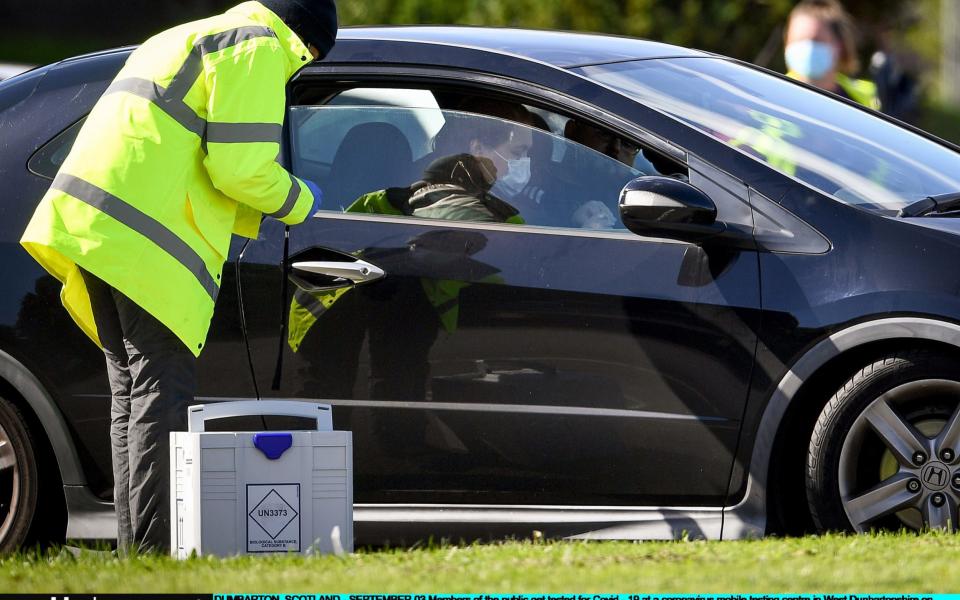Sturgeon paves way for 'blunter' lockdown restrictions as Scottish cases continue to spiral

Nicola Sturgeon has warned Scots she is prepared to reimpose "blunter" lockdown restrictions including the blanket closure of pubs and restaurants if coronavirus cases continue to spiral, after the infection rate doubled in a week.
After daily deaths also hit an eleven-week high, new figures suggest that a partial lockdown in parts of the West of Scotland has so far failed to get case numbers under control, with new infections per 100,000 people rapidly rising despite a ban on visiting other households indoors.
The First Minister all but confirmed that entertainment venues such as concert halls and theatres, as well as soft play areas, would not be given the green light to reopen on Thursday as had previously been planned. Advice that non-essential workplaces and call centres should remain closed will remain in force.
She reported on Tuesday that there had been three Covid-19 deaths across the country, the highest daily total since late June, with new cases recorded in every mainland health board area in the country.
'We shouldn't be complacent.'
First Minister of Scotland @NicolaSturgeon says leaders need to look to countries like France and Spain and do 'everything in their power to stop going in that direction.'
Watch GMB 👉 https://t.co/yyUUJmzswF pic.twitter.com/QmQA5kLAcO— Good Morning Britain (@GMB) September 8, 2020
There have been 1,241 new cases confirmed in just the first eight days of September, compared to 376 across the whole of July, when there was a major easing of lockdown rules.
The Scotland-wide rate of new infections per 100,000 people had risen from around 10 last week, when restrictions on visiting other households were introduced in Glasgow, East Renfrewshire and West Dunbartonshire, to just under 20, Ms Sturgeon said.
Despite the new measures, cases have continued to spiral in the areas over the past week, raising the prospect that harsher restrictions will have to be deployed.
In West Dunbartonshire, new cases are up to 62 per 100,000, from 33 last week. In Glasgow City, they have risen from 22 per 100,000 to 44 while in East Renfrewshire they are up from 19 to 37.
The partial lockdown was extended to the Refrewshire and East Dunbartonshire on Tuesday meaning around a fifth of the Scottish population, or 1.1 million people, are affected.
The measures could be extended to North and South Lanarkshire, as well as Inverclyde, in the coming days. In East Dunbartonshire, there are currently 29 cases per 100,000 while in Renfrewshire, the figure is 32.

In contrast, a local partial lockdown in Aberdeen, which did include the closure of bars and restaurants, was initially triggered by a rate of just 14 cases per 100,000.
The First Minister insisted she did not to “go backwards” by closing pubs, bars, restaurants and cafes, but said that “blunter instruments” would have to be deployed to control the spread of the virus if cases do not fall.
While indoor family gatherings and house parties attended by young people have been largely blamed for the recent rise in cases, there is also evidence that the virus is spreading in bars and restaurants.
In a leaked email, Linda de Caestecker, the public health director for NHS Greater Glasgow and Clyde, said that while in West Dunbartonshire many cases were linked to paties and family gatherings, in Glasgow City, “more cases are associated with bars and restaurants.”
The hospitality sector has warned that a second shutdown would prove “devastating” for businesses.
Watch FM @NicolaSturgeon outline the restrictions which currently apply to people living in:
🔹 Glasgow City
🔹 East Renfrewshire
🔹 Renfrewshire
🔹 East Dunbartonshire
🔹 West Dunbartonshire
Find out more and view the regulations ➡️ https://t.co/e4pUxmYOMA pic.twitter.com/y5kmjXLCpB— Scottish Government (@scotgov) September 8, 2020
“The economy is suffering and we can’t lose sight of that; economic catastrophe causes an impact in terms of lives, illness and other consequences too,” Ms Sturgeon said. “But we can’t escape the situation we’re facing right now… we have to find ways of containing it.
“If we can’t use the basic measures... then we have to use blunter instruments. But we don’t want to do that if we can avoid it. So I’m pleading to people, everybody take this moment as a real reminder of the need for all of us to do this [follow the rules] and it will make a difference.”
While it was announced that fans will be allowed back into football stadiums for two Scottish Premiership fixtures this weekend on a trial basis, only 300 home supporters will be allowed to attend.
The majority of new infections have been found in the 18 to 39 age group, who are far less likely to suffer major illness as a result of contracting Covid-19. However, Ms Sturgeon said she feared the virus would soon spread to older, more vulnerable people if cases continue to rise and urged people in their teens, 20s and 30s to "think about your loved ones as well as yourselves”.
She confirmed that a new marketing campaign is set to be launched in an effort to persuade young people to follow the rules, with police call-outs to illegal house parties continuing to rise despite repeated pleas from ministers and health officials for young people not to attend.
Jason Leitch, the Scottish Government’s 51-year-old clinical director, who has become the face of an advertising campaign designed to raise awareness of public health advice, said that “influencers” are being approached who young people may pay more attention to.
Asked whether figures such as the pop star Lewis Capaldi or Scotland football captain Andy Robertson might make more effective messengers to young people, Professor Leitch said: “We are mindful that we want to use as many faces and influencers as we can in that space, not just us. We want to use everything available.”

 Yahoo News
Yahoo News 